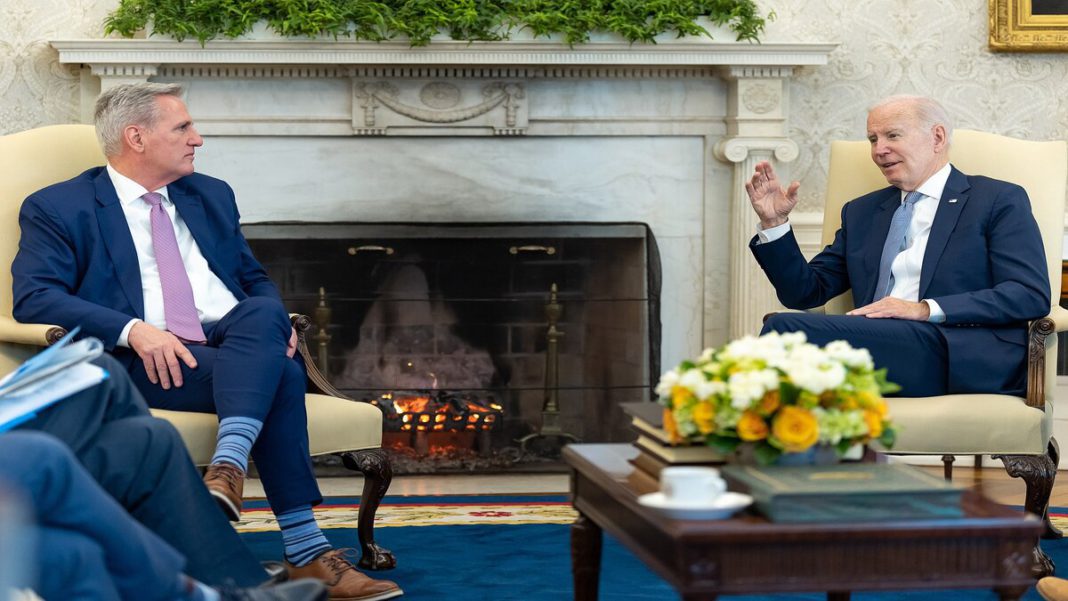UNITED STATES: U.S. President Joe Biden and House Speaker Kevin McCarthy reached a tentative agreement to suspend the federal government’s $31.4 trillion debt ceiling late Saturday, breaking a months-long impasse.
However, the agreement was unveiled in a sombre tone that reflected the contentious nature of the talks and the challenging path it must travel through Congress before the United States runs out of money to pay its debts in early June.
“I just got off the phone with the president a bit ago. After he wasted time and refused to negotiate for months, we’ve come to an agreement in principle that is worthy of the American people,” McCarthy wrote on Twitter.
In a statement, Joe Biden called the agreement “an important step forward,” adding that “the agreement represents a compromise, which means not everyone gets what they want. That’s the responsibility of governing.”
The agreement would postpone the debt ceiling until January 2025 while curbing spending in the 2024 and 2025 budgets, recovering any COVID monies that were not used, accelerating the permitting process for some energy projects, and adding some new work requirements for food assistance programmes for low-income Americans.
The tentative agreement was reached in a flurry of conversations after months of back and forth. Earlier on Saturday night, Biden and McCarthy spoke on the phone for 90 minutes to discuss the deal. Later that evening, McCarthy briefed his colleagues, and then the White House and the House speaker spoke.
McCarthy told reporters on Capitol Hill, “We still have more work to do tonight to finish the writing of it.” McCarthy stated that he anticipates finishing the bill’s drafting on Sunday, then speaking with Biden on Monday, and having a vote on the agreement on Wednesday.
Finding a compromise that can pass the House, where the Republicans hold a 222-213 majority, and the Senate, where the Democrats hold a 51-49 majority, would require delicately treading the needle on both sides of the aisle before the president can sign it.
According to a person familiar with the agreement, negotiators have agreed to limit non-defence discretionary expenditure at 2023 levels for one year before raising it by 1% in 2025.
“It has historic reductions in spending and consequential reforms that will lift people out of poverty into the workforce and rein in government overreach—there are no new taxes or new government programmes,” stated McCarthy.
The deal will prevent an economically unsettling default so long as it is approved by the closely divided Congress before the Treasury Department runs out of money to pay all of its obligations, which it warned would happen if the debt ceiling issue was not resolved by June 5th.
Republicans, who are in charge of the House of Representatives, have pressed for significant budget cuts and other requirements. They have also been harshly critical of the agreement as early details have emerged.
Rep. Bob Good, a Republican and a member of the House Freedom Caucus, tweeted that he had heard the agreement would result in a $4 trillion debt increase and added, “If that is true, I don’t need to hear anything else. No one claiming to be a conservative could justify a YES vote.”
Earlier on Saturday, Dan Bishop of North Carolina referred to the agreement as an “utter capitulation in progress. By the side holding the cards.” A senior member of the House Freedom Caucus stated that they were assessing member opinion and were unclear about the vote totals.
Republicans claim they want to reduce spending in order to stop the growth of the nation’s debt, which is currently about equivalent to the GDP of the entire nation.
In order to reduce the debt, Biden and Democrats have pushed for more taxes on corporations and the rich while increasing expenditure on initiatives like community colleges that are completely free.
The protracted impasse over extending the debt ceiling alarmed the financial markets, weighed down stocks, and made the US pay record-high interest rates in some bond transactions.
According to analysts, a default would be much more costly and likely send the country into recession, disrupt the global economy, and increase unemployment.
For months, Biden refused to talk to McCarthy about future spending cuts, insisting that lawmakers first adopt a “clean” debt ceiling rise free of other restrictions and then provide a 2024 budget proposal in opposition to McCarthy’s March budget.
On May 16, Biden and McCarthy started holding substantive two-way negotiations. The task of raising the debt ceiling is still far from complete. Before bringing the measure to the floor for a vote, McCarthy has promised to give House members 72 hours to read it.
That will determine whether there are sufficient moderate members who favour the compromises in the plan to overcome opposition from both hard-right Republicans and progressive Democrats and pass a simple majority vote.
Then it will need to clear the Senate, where it will require a minimum of nine Republican votes to pass. Each chamber offers several chances to slow the procedure.
Also Read: Republicans Accuse White House of Showing Lack of Urgency as Debt Ceiling Talks Persist



